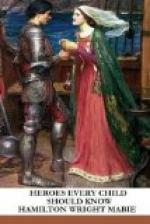All this while the Turks were close at hand, and ready to assault the King’s army so soon as a convenient occasion would arise. But they did not take King Richard unaware, for indeed he was as watchful as he was brave.
I will now set forth as briefly as may be the order of the army as it was set out for battle at Arsuf. On the right hand of the army was the sea, its front being set towards the south. In the van were the Templars, and next to these the Frenchmen in two divisions, the second being led by that Guy who called himself King of Jerusalem, and after the Frenchmen King Richard with his Englishmen; last of all, holding the rear-guard, were the Hospitallers. These are ever rivals of the Templars, and it was the King’s custom so to order his disposition that this rivalry should work for the common good. On one day the Templars would lead, and the Hospitallers bring up the rear; on another each would take the other’s place; and there was ever a mighty contention between the two companies which would bear itself the better. These two posts, it should be said, were the most full of peril; nor was any part of the army save only these two companies suffered to hold either the one or the other. Between the divisions there was a small space, not more that sufficient to mark one from the other: otherwise the soldiers stood and marched in as close array as might be. Also they moved very slowly, travelling less than a league in the space of two hours. And even the King with some chosen knights rode up and down the lines, watching at the same time the Turks, so that whenever they might make assault the army might be ready to meet them.
Now King Richard’s commandment had been that the Christians should on no account break their lines to attack the enemy, but should only defend themselves as best they could. There is nothing harder in the whole duty of a soldier than so to stand; even they who have been men of war from their youth grow greatly impatient; as for the younger sort they often fail to endure altogether. Many a man will sooner throw himself upon almost sure death than abide danger less by far standing still. And so it could be seen that day in the Christian army. The first to fail were the men that carried the cross-bows; nor, indeed, is it to be wondered at that when they had spent their store of bolts, they, having but short swords wherewith to defend themselves, should be ill content to hold their place. Many I did see throw away their bows and fly, thrusting themselves by main force into the ranks of the men-at-arms, who liked not to beat them back, nor yet to suffer them to pass. And they themselves had much ado to hold their ground, for it was a very fierce assault that they had to endure. In the first place there was such a shower of darts and stones and arrows that the very light of the sun itself was darkened, a thing which I had always before judged to be a fable, but saw that day to be possible. The greater part of them, it is true, fell without effect to the ground, for of twenty missiles scarce one served its purpose, but some were not cast in vain. As for the number, they lay so thick upon the ground that a man might gather twenty into his hand without moving from his place.




